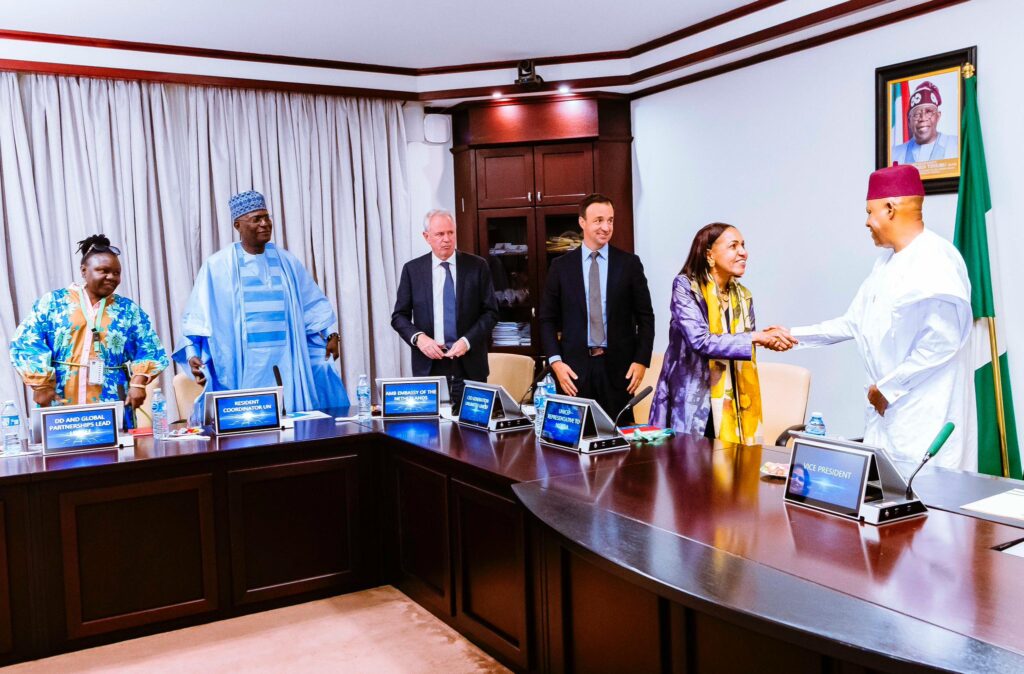Nigeria launches programme to connect 20 million Youth to Jobs by 2030

Abdullateef Fowewe
The Federal Government of Nigeria has unveiled a bold new national skills programme aimed at connecting 20 million young Nigerians to jobs, training, and entrepreneurship opportunities by 2030, with a commitment that at least 60% of beneficiaries will be women, revealed a statement on Thursday by the Senior Special Assistant to The President on Media & Communications (Office of The Vice President), Stanley Nkwocha.
The announcement coincides with Vice President Kashim Shettima’s appointment as chairman of the reactivated Generation Unlimited (GenU) Nigeria Board.
Speaking during the inaugural GenU Nigeria board meeting on Wednesday, VP Shettima described Nigeria’s youthful population as the nation’s “superpower and comparative advantage in a rapidly ageing world.”
He underscored, “With over 60 per cent of our population below the age of 25, we cannot afford to squander this asset. An advantage unrealised is merely potential wasted.”
Addressing the persistent challenges facing youth skills development, VP Shettima warned that Nigeria’s national skills ecosystem “faces a trilemma—too many young people excluded from the start, training disconnected from livelihoods, and inadequate infrastructure for hands-on learning.”
He stressed that “another isolated training scheme will not deliver us from these constraints. What we need is systemic change—a new architecture built to last.”
Central to the initiative is the Digital Access and Livelihoods Initiative (DALI), designed as a demand-driven national talent pipeline linking foundational and work-readiness training directly to jobs or enterprise pathways.
The Vice President said, “We need a platform to unify government, private sector leaders, development partners, and the boundless energy of our youth under a single banner… to replace fragmented efforts with a common front.”
Shettima pledged that all training under the programme would align with the National Skills Qualification Framework to ensure youth not only acquire skills but also have the credentials to compete globally.
“We owe young Nigerians jobs. We owe them hope. We owe them the future, not just promises, but proof that their country believes in them enough to invest in their success,” he said.
Minister of Youth Development, Ayodele Olawande, reinforced the government’s commitment, stating, “Nigerian youths are not limited.
We have the talent, creativity, and courage to thrive. What we need is a meaningful and enabling environment, and we must work together as one team to create and deliver real impact.”
Special Assistant on Workforce Development, Rimamskeb Nuhu, noted three major challenges the initiative aims to address, “foundational skills gap, livelihood disconnect, and infrastructure deficit.”
He described DALI’s two pillars as equipping underserved communities with foundational digital skills and establishing digital hubs to scale government efforts.
Since its 2021 launch, GenU 9JA has already benefited over 10 million youth through programmes including the FUCAP Campus Ambassadors Programme, Passport to Earning with Microsoft, and the Girls’ Education and Skills Partnership with FCDO.
UN officials echoed the call for sustained collaboration and investment.
UN Resident Coordinator Mohamed Fall said, “Every day, Nigerian youths demonstrate their potential. Together, we can drive large-scale impact…”
UNICEF Nigeria’s Wafaa Saeed highlighted the formal recognition of Youth Agency Marketplace as a national platform connecting youth to economic opportunities.
“Young Nigerians are not just beneficiaries of development, they are drivers of change,” she affirmed.
Global CEO of UNICEF Generation Unlimited, Kevin Frey, praised Nigeria’s leadership, saying, “The vision, partnerships, and commitment of young people here are charting a new course for youth ecosystems at scale.”
The partnership platform involving government, private sector giants like Microsoft, Airtel, and Unilever, and development agencies aims to transform youth innovation and employment landscapes through integrated skills development and job creation.




